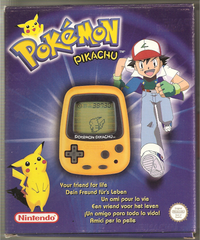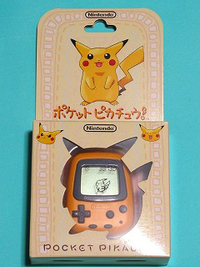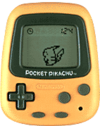Pokémon Pikachu: Difference between revisions
mNo edit summary |
m (Text replacement - "<br>↵{{Project Sidegames notice}}" to "{{Project Sidegames notice}}") |
||
| (64 intermediate revisions by 25 users not shown) | |||
| Line 1: | Line 1: | ||
{{Search|small handheld virtual pet|the [[ | {{Search|small handheld virtual pet|the [[core series]] game known as "Pokémon: Special Pikachu Edition"|Pokémon Yellow Version}} | ||
{{ | {{Infobox_game | ||
| colorscheme = yellow | |||
| bordercolorscheme = red | |||
| name = Pokémon Pikachu | |||
| jname = ポケットピカチュウ | |||
| boxart = Pokémon Pikachu.png | |||
| size = 200px | |||
| caption = European Pokémon Pikachu boxart | |||
| jbox = Pokémon Pikachu Japanese.png | |||
| jcaption = Japanese Pokémon Pikachu boxart | |||
| platform = Self-contained | |||
| category = Virtual pet | |||
| players = Single player | |||
| link_method = None | |||
| gen_series = [[Generation I|Generations I]] and {{gen|II}} | |||
| release_date_ja = March 27, 1998<ref>[http://www.nintendo.co.jp/n09/pokepika/ ''Pocket Pikachu'' - Nintendo] (retrieved April 17, 2023)</ref> | |||
| release_date_na = November 2, 1998<ref>[https://web.archive.org/web/20140527133853/http://www.fourhman.com/blog/images/earlypkmn-gi-big.jpg ''Prepare for the Pokemon Invasion!!!'' - Game Informer] (archived May 27, 2014; retrieved April 17, 2023)</ref><ref>[http://web.archive.org/web/19990218041314/http://www.nintendo.com/corp/press/110698.html ''Take A Walk on The Pokémon Side with Pokémon Pikachu'' - Nintendo of America] (archived February 18, 1999; retrieved April 17, 2023)</ref> | |||
| release_date_au = 1998<ref name="AUNZ">[https://archives.bulbagarden.net/wiki/File:Pokémon_Pikachu_AU_box_back.jpg ''Australia & New Zealand box art showing 1998 copyright date'' - Bulbagarden Archives] (retrieved April 17, 2023)</ref> | |||
| release_date_eu = ? | |||
| release_date_cn = ? | |||
| publisher = [[Nintendo]] | |||
| developer = [[Jupiter Corporation]] | |||
| website_en = [https://web.archive.org/web/20021022001458/http://www.nintendo.com/consumer/systems/other/pokemonpikachu.jsp Nintendo] <small>(archived)</small> | |||
| website_ja = [https://web.archive.org/web/20021201092013/http://www.pokemon.co.jp/game/hard/index.html Pokémon.co.jp] <small>(archived)</small> <br />[http://www.nintendo.co.jp/n09/pokepika/index.html Nintendo] | |||
}} | }} | ||
The '''Pokémon Pikachu''' (Japanese: '''ポケットピカチュウ''' ''Pocket Pikachu'') is a {{wp|step counter}} and virtual pet toy in which the player looks after a virtual pet {{p|Pikachu}}. | |||
It was released on March 27, 1998 in Japan, November 2, 1998 in the United States, and 1998 in Australia and New Zealand.<ref name="AUNZ" /> It was succeeded by the [[Pokémon Pikachu 2 GS]]. | |||
==Operation== | |||
The unit is strapped onto a belt and used as a pedometer. Every 20 steps the unit registers give the user 1 [[watt]], which is a currency that can be used to gamble or buy Pikachu presents. | |||
==Friendship== | |||
As Pikachu's [[friendship]] goes up (similar to the system in {{game|Yellow}}), more activities are available. If neglected, however, Pikachu will become angry and will not respond to anything the user does. Pikachu's friendship with the player increases faster if more watts are given at once, since its friendship value slowly decreases over time; the more watts recently given, the more time the player has to give again before Pikachu's friendship goes down. | |||
Pikachu will also do activities based on time. When turning on the device soon before 8:00 pm, Pikachu may be taking a shower, brushing its teeth, or getting into bed; Pikachu will also eat occasionally. Shaking the device during eating or sleeping will make Pikachu angry, and its friendship will drop. | |||
Pikachu has four levels of friendship: | |||
*Pikachu doesn't like the player | |||
** Most of the time, Pikachu will face away from the player. | |||
** Shaking the device will cause Pikachu to bounce up and down inside the screen, making it angry. | |||
** When the player presses a button to turn on the screen, there is a high chance that Pikachu will "shock" the player. | |||
** Getting Pikachu to stop disliking the player requires several thousand watts. | |||
*Pikachu is neutral towards the player (default) | |||
** Pikachu will mostly stand in place, occasionally turning slightly to look at the player. | |||
** Shaking the device will cause Pikachu to jog. | |||
** Occasionally, Pikachu can be seen eating, brushing its teeth (usually after eating), showering, or reading a book. | |||
*** Shaking the device while Pikachu is eating or sleeping will cause it to bounce around the screen and get angry at the player, lowering friendship. | |||
*Pikachu likes the player | |||
** Pikachu will appear larger on the screen, having moved closer. | |||
** It will turn around from left to right, with its back to the player, until the device is shaken. It will then turn around and face the player. | |||
** Pikachu may perform any of the actions it can if it is neutral to the player, as well as playing with blocks or in a sand box. | |||
*** Shaking the device while it plays will cause its toys to fall over, lowering its friendship with the player. | |||
*Pikachu loves the player | |||
**Pikachu faces the player, taking up most of the screen. | |||
**Shaking the device will cause Pikachu to wave at the player before walking. | |||
**Instead of walking, Pikachu may rarely ride a bicycle or motorcycle. | |||
==Features== | |||
===Pedometer=== | |||
The device has a built in step counter. For every 20 steps the user takes, one watt is awarded. Shaking the device will add extra steps, but doing so while Pikachu is eating, bathing, or sleeping will lower its friendship stat. Doing so while the screen is off will not result in a loss of friendship. | |||
Steps can be reset from the settings menu. Watts earned will not be reset, nor will Pikachu's current friendship level. | |||
== | ===Clock=== | ||
Shows the current time, as well as allowing the player to set an alarm. The alarm will be silent but display on the screen if the sound is turned off. | |||
== | ===Gift=== | ||
This allows the player to give watts to Pikachu, which will raise its friendship. Pikachu will react differently depending on how many watts it is given. Small amounts (or giving no watts at all) will result in Pikachu reacting negatively, while more will unlock new ways for Pikachu to play on the screen. | |||
=== | ===Slot machine=== | ||
A mini game where watts can be gambled. Like in the main series video games, the slot machine is stopped when the player presses the button, once for each reel. However, the player can only bid 5 watts and there is only one row on the display. | |||
* Rewards | |||
** Magikarp: 35 watts | |||
** Flower or Pikachu: 50 watts | |||
** 7's: 500 watts | |||
== | ==Device== | ||
[[File:Pocket Pikachu.png|thumb|100px|The device]] | |||
The | The device has a yellow case and a monochrome screen. It has the same button layout as the original Game Boy. The directional pad is used to select options from the main and settings menus and adjust the numbers on the clock and Gift options. The Select button shows Pikachu's current friendship level. The Start button opens the settings menu, which contains options for sound, the current time, and resetting the step count. The A button confirms selection, while the B button returns to Pikachu. Additionally, a reset button on the front of the device completely resets the player's progress. | ||
==Trivia== | ==Trivia== | ||
* | * One of the treasures in ''{{smw|Wario Land 3}}'', the Pocket Pet, is a reference to the Pokémon Pikachu. It is found at {{smw|The Big Bridge}}; however, the {{player}} cannot interact with it. | ||
* The Pokémon Pikachu | * The Pokémon Pikachu's design was used as the basis for a ''Hello Kitty'' virtual pet, which was produced by Nintendo. | ||
==In other languages== | |||
{{langtable|color={{yellow color}}|bordercolor={{red color light}} | |||
|zh_cmn=神奇宝贝皮卡丘 ''{{tt|Shénqí Bǎobèi Píkǎqiū|Pokémon Pikachu}}'' | |||
|da=Pokémon Pikachu | |||
|nl=Pokémon Pikachu | |||
|fi=Pokémon Pikachu | |||
|fr=Pokémon Pikachu | |||
|de=Pokémon Pikachu | |||
|it=Pokémon Pikachu | |||
|es=Pokémon Pikachu | |||
|sv=Pokémon Pikachu | |||
}} | |||
==External links== | |||
* [http://megaraichu.tripod.com/pikachu.html Unofficial Pokémon Pikachu FAQ] | |||
==References== | |||
<references/> | |||
{{-}} | {{-}} | ||
{{Other games}}{{Project Sidegames notice}} | |||
{{Other games}} | |||
{{Project Sidegames notice}} | |||
[[Category:Games]] | [[Category:Games]] | ||
| Line 58: | Line 112: | ||
[[Category:Electronic devices]] | [[Category:Electronic devices]] | ||
[[de:Pokémon Pikachu]] | |||
[[es:Pokémon Pikachu]] | |||
[[fr:Pokémon Pikachu]] | [[fr:Pokémon Pikachu]] | ||
[[it:Pokémon Pikachu]] | |||
[[ja:ポケットピカチュウ]] | [[ja:ポケットピカチュウ]] | ||
[[zh:宝可梦 皮卡丘(计步器)]] | |||
Latest revision as of 08:22, 21 July 2024
- This article is about the small handheld virtual pet. For the core series game known as "Pokémon: Special Pikachu Edition", see Pokémon Yellow Version.
| Pokémon Pikachu ポケットピカチュウ | |
|---|---|
 European Pokémon Pikachu boxart | |
Basic info
| |
| Platform: | Self-contained |
| Category: | Virtual pet |
| Players: | Single player |
| Connectivity: | None |
| Developer: | Jupiter Corporation |
| Publisher: | Nintendo |
| Part of: | Generations I and II |
Ratings
| |
| CERO: | N/A |
| ESRB: | N/A |
| ACB: | N/A |
| OFLC: | N/A |
| PEGI: | N/A |
| GRAC: | N/A |
| GSRR: | N/A |
Release dates
| |
| Japan: | March 27, 1998[1] |
| North America: | November 2, 1998[2][3] |
| Australia: | 1998[4] |
| Europe: | ? |
| South Korea: | N/A |
| Mainland China: | ? |
| Hong Kong: | N/A |
| Taiwan: | N/A |
Websites
| |
| Japanese: | Pokémon.co.jp (archived) Nintendo |
| English: | Nintendo (archived) |
|
Japanese boxart
| |
The Pokémon Pikachu (Japanese: ポケットピカチュウ Pocket Pikachu) is a step counter and virtual pet toy in which the player looks after a virtual pet Pikachu.
It was released on March 27, 1998 in Japan, November 2, 1998 in the United States, and 1998 in Australia and New Zealand.[4] It was succeeded by the Pokémon Pikachu 2 GS.
Operation
The unit is strapped onto a belt and used as a pedometer. Every 20 steps the unit registers give the user 1 watt, which is a currency that can be used to gamble or buy Pikachu presents.
Friendship
As Pikachu's friendship goes up (similar to the system in Pokémon Yellow), more activities are available. If neglected, however, Pikachu will become angry and will not respond to anything the user does. Pikachu's friendship with the player increases faster if more watts are given at once, since its friendship value slowly decreases over time; the more watts recently given, the more time the player has to give again before Pikachu's friendship goes down.
Pikachu will also do activities based on time. When turning on the device soon before 8:00 pm, Pikachu may be taking a shower, brushing its teeth, or getting into bed; Pikachu will also eat occasionally. Shaking the device during eating or sleeping will make Pikachu angry, and its friendship will drop.
Pikachu has four levels of friendship:
- Pikachu doesn't like the player
- Most of the time, Pikachu will face away from the player.
- Shaking the device will cause Pikachu to bounce up and down inside the screen, making it angry.
- When the player presses a button to turn on the screen, there is a high chance that Pikachu will "shock" the player.
- Getting Pikachu to stop disliking the player requires several thousand watts.
- Pikachu is neutral towards the player (default)
- Pikachu will mostly stand in place, occasionally turning slightly to look at the player.
- Shaking the device will cause Pikachu to jog.
- Occasionally, Pikachu can be seen eating, brushing its teeth (usually after eating), showering, or reading a book.
- Shaking the device while Pikachu is eating or sleeping will cause it to bounce around the screen and get angry at the player, lowering friendship.
- Pikachu likes the player
- Pikachu will appear larger on the screen, having moved closer.
- It will turn around from left to right, with its back to the player, until the device is shaken. It will then turn around and face the player.
- Pikachu may perform any of the actions it can if it is neutral to the player, as well as playing with blocks or in a sand box.
- Shaking the device while it plays will cause its toys to fall over, lowering its friendship with the player.
- Pikachu loves the player
- Pikachu faces the player, taking up most of the screen.
- Shaking the device will cause Pikachu to wave at the player before walking.
- Instead of walking, Pikachu may rarely ride a bicycle or motorcycle.
Features
Pedometer
The device has a built in step counter. For every 20 steps the user takes, one watt is awarded. Shaking the device will add extra steps, but doing so while Pikachu is eating, bathing, or sleeping will lower its friendship stat. Doing so while the screen is off will not result in a loss of friendship.
Steps can be reset from the settings menu. Watts earned will not be reset, nor will Pikachu's current friendship level.
Clock
Shows the current time, as well as allowing the player to set an alarm. The alarm will be silent but display on the screen if the sound is turned off.
Gift
This allows the player to give watts to Pikachu, which will raise its friendship. Pikachu will react differently depending on how many watts it is given. Small amounts (or giving no watts at all) will result in Pikachu reacting negatively, while more will unlock new ways for Pikachu to play on the screen.
Slot machine
A mini game where watts can be gambled. Like in the main series video games, the slot machine is stopped when the player presses the button, once for each reel. However, the player can only bid 5 watts and there is only one row on the display.
- Rewards
- Magikarp: 35 watts
- Flower or Pikachu: 50 watts
- 7's: 500 watts
Device
The device has a yellow case and a monochrome screen. It has the same button layout as the original Game Boy. The directional pad is used to select options from the main and settings menus and adjust the numbers on the clock and Gift options. The Select button shows Pikachu's current friendship level. The Start button opens the settings menu, which contains options for sound, the current time, and resetting the step count. The A button confirms selection, while the B button returns to Pikachu. Additionally, a reset button on the front of the device completely resets the player's progress.
Trivia
- One of the treasures in Wario Land 3, the Pocket Pet, is a reference to the Pokémon Pikachu. It is found at The Big Bridge; however, the player cannot interact with it.
- The Pokémon Pikachu's design was used as the basis for a Hello Kitty virtual pet, which was produced by Nintendo.
In other languages
| |||||||||||||||||||||||||||||||||
External links
References
- ↑ Pocket Pikachu - Nintendo (retrieved April 17, 2023)
- ↑ Prepare for the Pokemon Invasion!!! - Game Informer (archived May 27, 2014; retrieved April 17, 2023)
- ↑ Take A Walk on The Pokémon Side with Pokémon Pikachu - Nintendo of America (archived February 18, 1999; retrieved April 17, 2023)
- ↑ 4.0 4.1 Australia & New Zealand box art showing 1998 copyright date - Bulbagarden Archives (retrieved April 17, 2023)

|
This article is part of Project Sidegames, a Bulbapedia project that aims to write comprehensive articles on the Pokémon Sidegames. |

